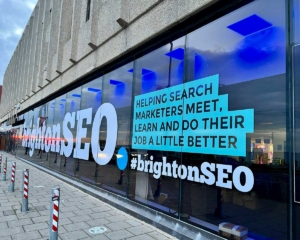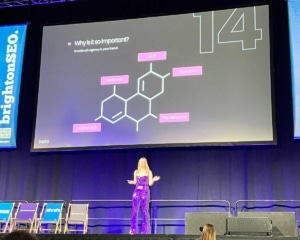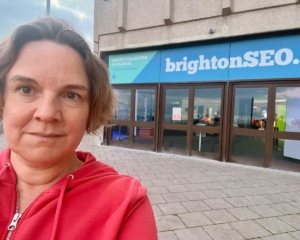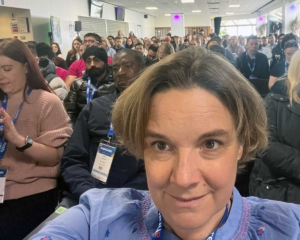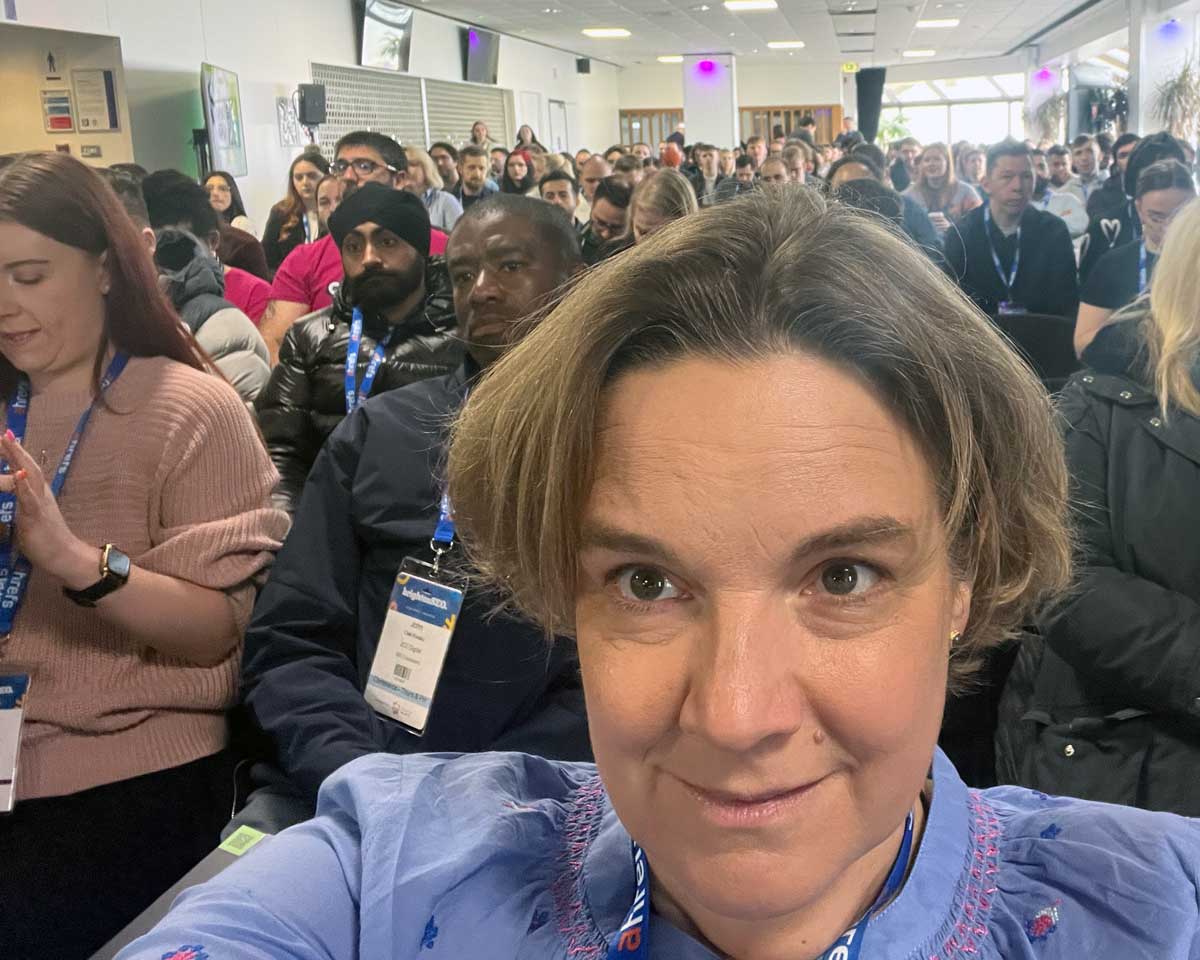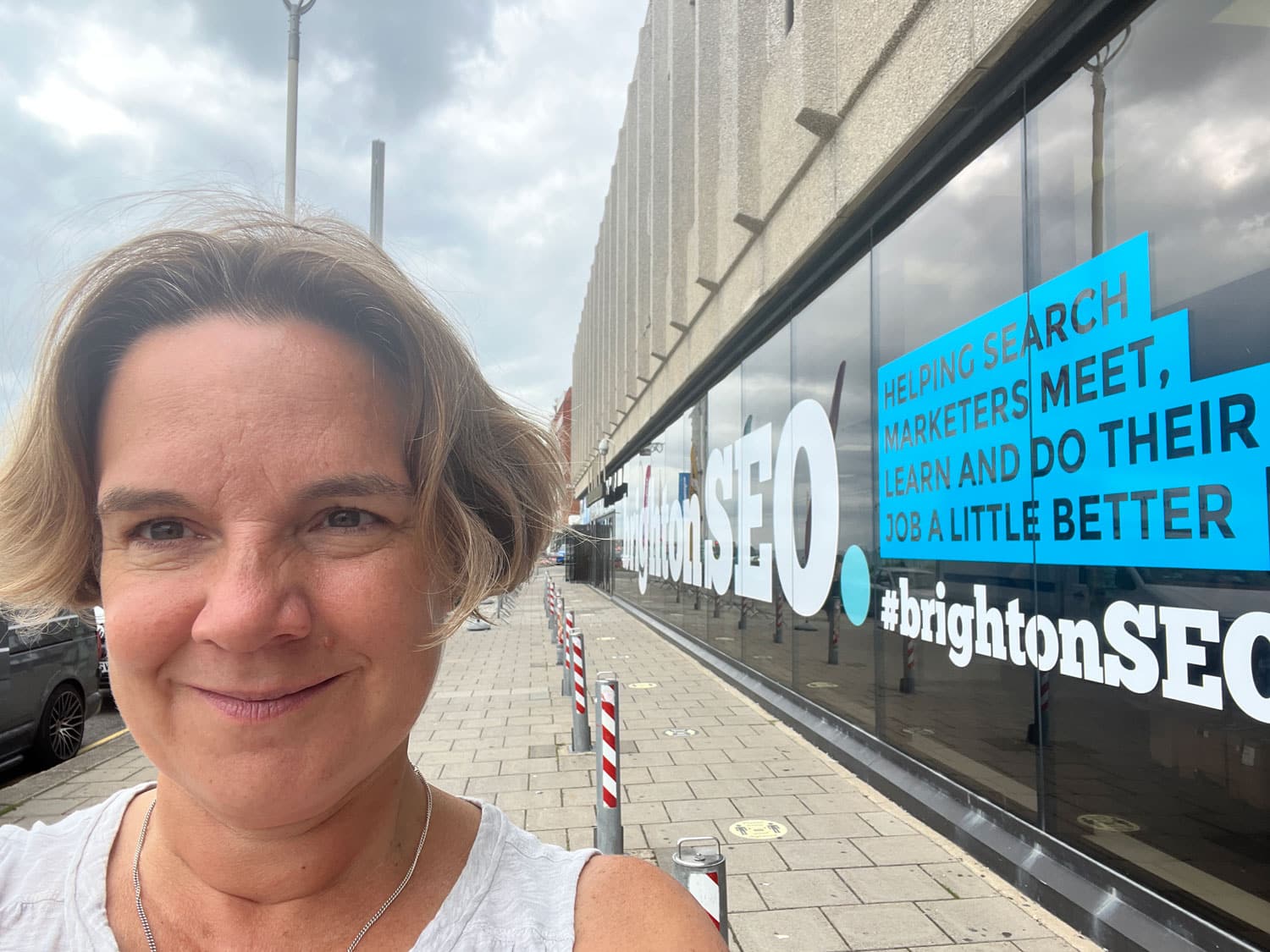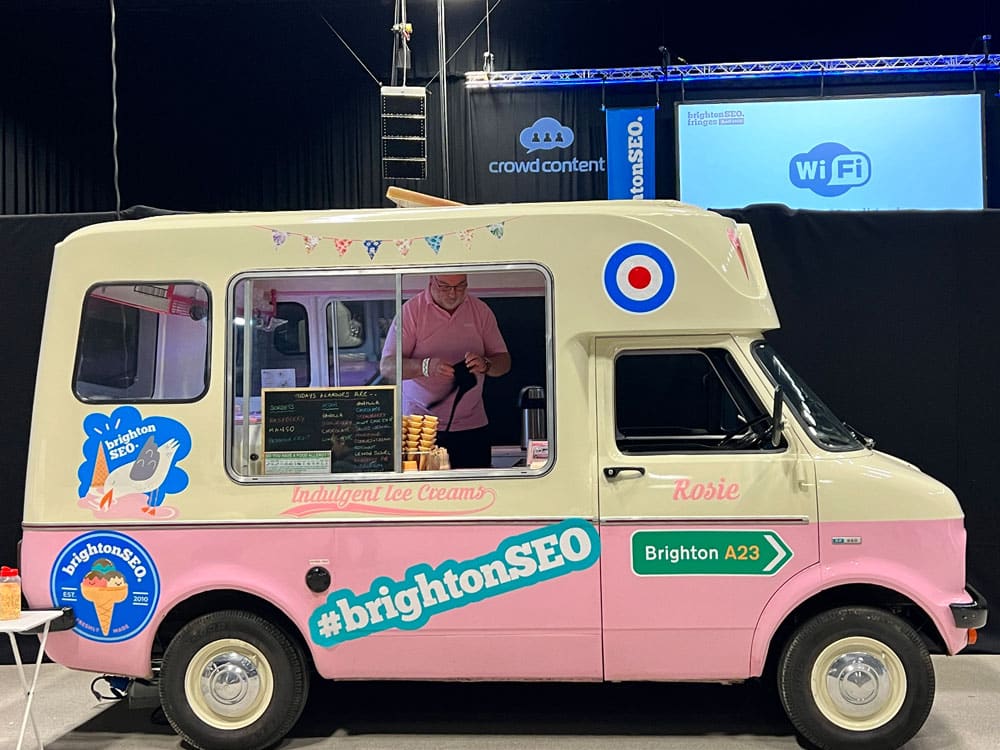Brighton SEO April 2024
AI SERPS, Attribution Challenges and Lots of Good Stuff on E-Commerce
Digital Marketing Update – My Takeaways from Brighton SEO April 2024
If you also made it to Brighton SEO last week for the twice yearly gathering of Search Marketers, no doubt your brain is still buzzing with ideas, updates, people to contact and suggestions to help you do your job better. If you didn’t go this time, put it in your diary for October. The conference is not purely focussed on SEO. There were really helpful talks on Marketing Measurement, PPC Ads, Paid Social, Analytics, AI, Reporting, Cookieless Marketing, and everything you’d expect on Content and Technical SEO. I went to as many talks as I could fit in, in between swag gathering, and have picked out a few highlights from each below. So, grab an ice-cream, perch a seagull on your shoulder and take in two days of talks in about ten minutes….
If you’d like to find out more about any of the speakers, you can click through to their LinkedIn profiles, or use the Brighton SEO Site to read a brief bio and see if they have provided their slide decks. These bite-size highlights are in my own words, so may not reflect exactly what was said. If any of those of you who spoke read this and think I have got something wrong, do get in touch and I’ll correct!
Tom Capper – SGE is not the future of SERPs.
https://www.linkedin.com/in/thcapper
The main limits stopping Google from rolling out SGE at the moment are legal issues (around crediting sources), user experience issues (the need to provide benefit over the existing SERP) and commercial issues (how to monetise it). It’s unlikely to replace what’s there now as Generative AI is not the best answer for every single search query – so expect evolution, not revolution. In the meantime, focus on the SEO tactics hold up for SERP or SGE – e.g. local packs, product feeds. Those parts of the ecosystem are going to stick around.
Kapwom Dingis – SGE and the future of search for publishers.
https://www.linkedin.com/in/kapwom-dingis-39033088/
SGE uses AI to generate answers to questions, so it’s good for zero click searches, like what the weather is doing, but those aren’t most SEOs are not really interested in those searches. SGE makes heavy use of video and images, so make sure you’ve got strong visual content, and that it is unique, especially for e-commerce products. Likewise, if you can legitimately offer a differing view on a common question, that might help you show up. How much you decide to focus on optimising for AI might also depend on the demographic of your customers. SGE is reporting higher satisfaction scores with 18-24 year olds.
Marcus Tober – Google’s search strategy: balancing AI and market realities.
https://www.linkedin.com/in/marcustober/
Google is the fourth largest company in the world, it can’t make mistakes that easily, so it may not roll out SGE just yet. At the moment, Google is more likely to focus on being the One Stop Solution for e-commerce. It is already introducing ways to make browsing more like shopping the High Street, with more diversity in the SERP, and a Direct Checkout button, so customers can buy from you without even visiting your site. To show up in this ecosystem, focus on the usual suspects – relevant, quality content, server performance, backlinks, and domain authority. Rewrite and refresh content regularly. For example, if you have a blog on the 10 Best Running Shoes, update it each season.
Pascalle Bergmans – Stories that Sell.
https://www.linkedin.com/in/pascalle-bergmans/
What kind of people are your customers and how will you get them to trust you? Will that trust be task-based, because you do a good job (like Dutch people and Sam!), or relationship-based, because they like you? The story you tell should vary accordingly. Remember to communicate with them, not just inform. Build some emotional urgency and check in with your audience to make sure they are hearing and understanding you. Make them want to hear more from you.
Rin Hamburgh – How to Leverage Subject Matter Experts to Create EEAT boosting super content.
https://www.linkedin.com/in/rinhamburgh/
If you are expecting your inhouse subject matter experts to develop content for you, remember they are not marketers. Give them a really good brief, with tone of voice and branding guidelines, a clear content programme, and sell them the benefits of helping your organisation by creating this content. This process needs a lot of management and can be like herding cats. Appoint a content champion to manage the process, edit the content and make sure it ends up consistent.
Dixon Jones – Writing content that search engines (and humans) can really understand.
https://www.linkedin.com/in/dixonjones/
Portfolio Theory is the idea that you should make sure you have enough variation in your portfolio to cover the parts that don’t work so well at any time. Humans have so many variations in their interests and behaviour, that you could believe Portfolio Theory has been applied to Humanity. To get a story right for a customer: find their tribe, understand the tribe, make that tribe tick. Don’t just jump from your business to their tribe – find the real connection. There is always a link to be found.
E-Commerce Panel Podcast – Neha Khanna, Lorcan Fearon, Lucia Dello, Caleb Chatfield.
https://www.linkedin.com/in/nkkhanna/
https://www.linkedin.com/in/lorcan-fearon/
https://www.linkedin.com/in/calebchatfield/
Current challenges for e-commerce marketers revolve around:
- Data – Getting consistent, meaningful data you can trust
- Attribution – know what the truth is!
- Nerves – Businesses and customers both have uncertainty about the market and the economy. This is hard for SEOs to deal with as we can’t make promises.
- Mindset – People see SEO as housekeeping, something they should be doing, but it’s not as exciting as creating social content or paid ads.
To get buy-in for SEO, start small and (hopefully) show the impact before you roll-out fully. This allows you to both test your theory and give confidence to the client, e.g. optimise certain pages, and show those work before doing the whole thing. You don’t fail with an A/B test. You either win or you learn.
Make sure you are working on the KPIs that matter and have all the information you need. Do you know which are the more profitable products? Which products are selling out? Any price promotions? Refund rates per category? What are the problem products? Are shipping costs working out to be profitable? What is retention like? How is CLV? Do a Gap Analysis of your own awareness. What are the things you really need to know about the business and how do you find that info?
Danielle Gipps – Treat your social strategy like TV advertising and start selling stories.
https://www.linkedin.com/in/danielle-gipps-7aa098110/
Our attention spans are not shrinking (did you sit through Oppenheimer?), but we are more aware of what we are interested in and what we are not. If you don’t get your viewer or reader’s attention in the first few seconds, they are unlikely to stick around.
When your core audience on Socials are all your customers already, you need to broaden your horizons and make other people notice you. Make your stuff different from the sea of creative you see from all your competitors. Will people remember your ad in six month’s time, like the Cadbury’s gorilla or a John Lewis Christmas ad. TV Ads that succeed all have a story, or an emotional through-line or are just so bonkers they are remembered. Could any of your current Social creative run on TV? If not, why not? Could you make them better so they could?
Also remember that ROAS is not a very useful metric for Social. It works on a very short-term basis, like the immediate search then buy behaviour you see with Google Ads. Paid Social works more like TV ads. When you see the Gorilla ad you don’t immediately pop out for a chocolate bar. For Paid Social, look instead at First Click attribution. Was it you that introduced someone to the brand? Social can be the missing piece at the top of the funnel by introducing the brand to new audiences.
Georgia Piccolo – Embracing change: prepare your strategy for a cookieless future.
https://www.linkedin.com/in/giorgia-piccolo/
The consequences of losing cookies are not just about difficulties in reporting and cross domain tracking. It will also make it hard to monitor ad frequency so we may end up spamming our audiences as we can’t see how often they’ve seen the ads – so they might hide them.
For existing customers, the best way to address this is to make sure you are collecting and using first party data – mailing lists, customer lists, website and social media analytics. Collect that data and use it where you can by uploading your lists. Use Enhanced Conversions on Google. Use the Conversion APIs on Meta and LinkedIn.
That works for existing users but how do we find new users to target? Leverage AI and Machine Learning. Most of the platforms are using these tools in their advertising to predict which audiences will be most receptive to your ads, such as Meta Advantage + Audience targeting and LinkedIn Predictive Audiences. Also think about Contextual Advertising, promoting your products alongside complementary offers, Strategic Partnerships and Affiliates. Shift your data strategy now to power up your ads.
Lorcan Fearon – Everything I’ve Learned in 5 Years of Doing SEO on Shopify.
https://www.linkedin.com/in/lorcan-fearon/
SEO is like a game of snakes and ladders. Shopify is not a cheat code, you need to still be good at SEO. You must learn and master the basics. Get your Collection pages right and use the SERP to find what Collection pages you could benefit from. Use automated tags on products to the Collection pages pick them up and do the heavy lifting for you. If you want to play with any of this, duplicate the Theme and use the Shopify Sandbox environment to test before you break stuff!
Victoria Roscow – How You Can Out Perform Big Brands Without Thousands of SKUs.
(or How To Compete with Amazon!).
https://www.linkedin.com/in/victoria-roscow-196925114/
Don’t believe everything Google says about SEO for smaller sites. Often the things that Googlers say won’t make a difference, in fact do. Product Description length matters. Can you write more of a blog about your product and put that on the product page? Could you add video? Content is king!
Invest fully in optimising targeted areas such as Collection pages, don’t half-arse it across the board. Don’t neglect the more uncommon aspects of SEO, get the tech right too.
Anna Moragli – Cross-Channel E-Commerce SEO Integration: Boost Visibility, Multiply Sales.
https://www.linkedin.com/in/anna-moragli/
Think of the whole funnel of keywords behind the search term you want to rank for. There are lots of questions to be asked before a customer gets to the point of buying. What are those questions? How could you optimise for them? Don’t just look at the SERP. Look at Google but also TikTok, Amazon, Reddit, Pinterest, Reviews. Take your keyword research further than most do now. Think about which terms are Top of the Funnel (TOFU), Middle of the Funnel (MOFU) and Bottom of the Funnel (BOFU) and which you should be optimising for. Include informational as well as commercial content to hit those search terms.
Remember that the best content is not always new content – The Lion King is a reworking of Hamlet!
Greg Gifford – Don’t forget the basics – how a simple mini audit changed the game.
https://www.linkedin.com/in/greggifford/
Give your clients a useful, punchy audit that they can easily run with and work from. Not just a preachy pile of sh*t they won’t understand! Make the titles Questions and Answers rather than jargon e.g. Do you have your location in your Title Tag?
Sell your SEO work by finding things that will make a quick difference to their business, rather than just telling potential clients how awesome you are. Focus on tactics rather than strategy. Strategy doesn’t matter if you don’t have the basics in place.
Ultimately a good score might only be in the 60s-70s on most audits. Even a great score doesn’t mean you’re going to jump to the top of search results. It just means that if your strategy is good you have everything in place to do that.
Annika Hattaja – How to diagnose your brand SEO health issues.
https://www.linkedin.com/in/annika-haataja/
Does your brand content (Home Page and About Us Page) pass the Grunt Test? (Donald Miller) Can you answer these three questions by looking quickly at your homepage?
- What does this business offer?
- How will it improve my life?
- How can I buy it?
Monitor the performance of both your branded and unbranded traffic – what can you learn from their different behaviours?
Leigh Buttrey – Using GA4 to track and optimise SEO Performance.
https://www.linkedin.com/in/leighbuttrey/
Data matters – without data you’re just an idiot with an opinion.
Look at the Advertising – Conversion Paths report in GA4 to see how your marketing channels are working at the Early, Mid and Late Touchpoints. That gives you an idea of what you’re missing – e.g. do you need more Organic Content suitable to top of the funnel?
Filter by Organic Search and look at total Revenue (or Key Events for lead generation sites), to see the real wins from SEO.
Gareth Beck – Things You Should Optimise in GTM Containers.
https://www.linkedin.com/in/garethb/
Take ownership of your GTM and clean it up. Take off any unused Tags and Triggers (such as the UA ones), move Custom HTML and JavaScript server-side if you can. Implement Social Pixels using their templates rather than HTML scripts.
Keep a spreadsheet with all your tags and triggers details, with who uses them and why they are on there. Take off any you no longer need. Be very, very wary of any tags that could give access to a site with sensitive content. The Met Police unwittingly exposed very sensitive data by having their Meta Pixel on every page.
All in all, another great Brighton SEO event. The only downside for me was that Measurefest and the Paid Ads and Paid Social fringe events were merged into the main event, rather than on a separate day. This meant it was a bit harder to get to all the talks I wanted to see, so I am looking forward to the video releases. You can register now to pre-order the April 2024 Video Bundle (or even go back and watch last year’s). I hope to see you in Brighton next time.

